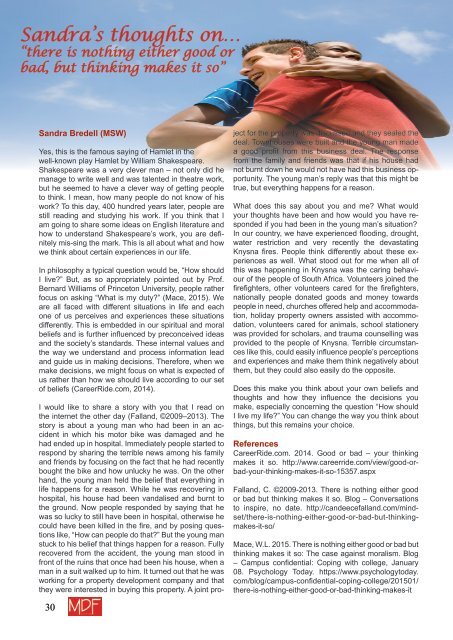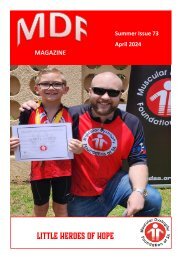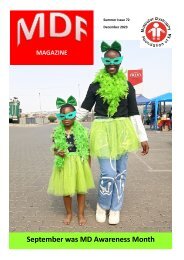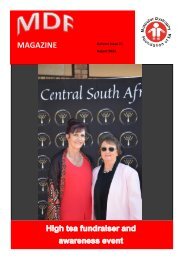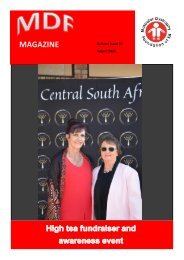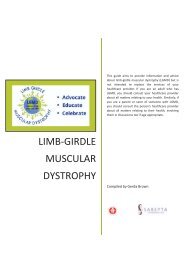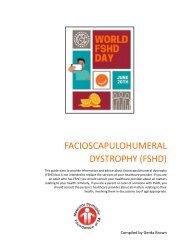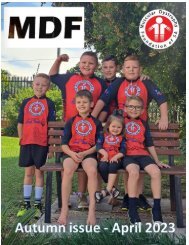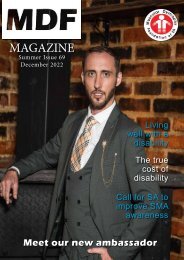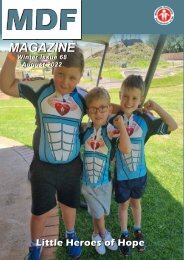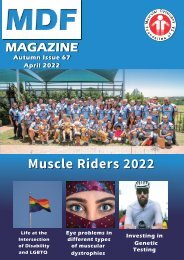MDF Magazine Issue 53 August 2017
Create successful ePaper yourself
Turn your PDF publications into a flip-book with our unique Google optimized e-Paper software.
Sandra’s thoughts on…<br />
“there is nothing either good or<br />
bad, but thinking makes it so”<br />
Sandra Bredell (MSW)<br />
Yes, this is the famous saying of Hamlet in the<br />
well-known play Hamlet by William Shakespeare.<br />
Shakespeare was a very clever man – not only did he<br />
manage to write well and was talented in theatre work,<br />
but he seemed to have a clever way of getting people<br />
to think. I mean, how many people do not know of his<br />
work? To this day, 400 hundred years later, people are<br />
still reading and studying his work. If you think that I<br />
am going to share some ideas on English literature and<br />
how to understand Shakespeare’s work, you are definitely<br />
mis-sing the mark. This is all about what and how<br />
we think about certain experiences in our life.<br />
In philosophy a typical question would be, “How should<br />
I live?” But, as so appropriately pointed out by Prof.<br />
Bernard Williams of Princeton University, people rather<br />
focus on asking “What is my duty?” (Mace, 2015). We<br />
are all faced with different situations in life and each<br />
one of us perceives and experiences these situations<br />
differently. This is embedded in our spiritual and moral<br />
beliefs and is further influenced by preconceived ideas<br />
and the society’s standards. These internal values and<br />
the way we understand and process information lead<br />
and guide us in making decisions. Therefore, when we<br />
make decisions, we might focus on what is expected of<br />
us rather than how we should live according to our set<br />
of beliefs (CareerRide.com, 2014).<br />
I would like to share a story with you that I read on<br />
the internet the other day (Falland, ©2009–2013). The<br />
story is about a young man who had been in an accident<br />
in which his motor bike was damaged and he<br />
had ended up in hospital. Immediately people started to<br />
respond by sharing the terrible news among his family<br />
and friends by focusing on the fact that he had recently<br />
bought the bike and how unlucky he was. On the other<br />
hand, the young man held the belief that everything in<br />
life happens for a reason. While he was recovering in<br />
hospital, his house had been vandalised and burnt to<br />
the ground. Now people responded by saying that he<br />
was so lucky to still have been in hospital, otherwise he<br />
could have been killed in the fire, and by posing questions<br />
like, “How can people do that?” But the young man<br />
stuck to his belief that things happen for a reason. Fully<br />
recovered from the accident, the young man stood in<br />
front of the ruins that once had been his house, when a<br />
man in a suit walked up to him. It turned out that he was<br />
working for a property development company and that<br />
they were interested in buying this property. A joint project<br />
for the property was discussed and they sealed the<br />
deal. Townhouses were built and the young man made<br />
a good profit from this business deal. The response<br />
from the family and friends was that if his house had<br />
not burnt down he would not have had this business opportunity.<br />
The young man’s reply was that this might be<br />
true, but everything happens for a reason.<br />
What does this say about you and me? What would<br />
your thoughts have been and how would you have responded<br />
if you had been in the young man’s situation?<br />
In our country, we have experienced flooding, drought,<br />
water restriction and very recently the devastating<br />
Knysna fires. People think differently about these experiences<br />
as well. What stood out for me when all of<br />
this was happening in Knysna was the caring behaviour<br />
of the people of South Africa. Volunteers joined the<br />
firefighters, other volunteers cared for the firefighters,<br />
nationally people donated goods and money towards<br />
people in need, churches offered help and accommodation,<br />
holiday property owners assisted with accommodation,<br />
volunteers cared for animals, school stationery<br />
was provided for scholars, and trauma counselling was<br />
provided to the people of Knysna. Terrible circumstances<br />
like this, could easily influence people’s perceptions<br />
and experiences and make them think negatively about<br />
them, but they could also easily do the opposite.<br />
Does this make you think about your own beliefs and<br />
thoughts and how they influence the decisions you<br />
make, especially concerning the question “How should<br />
I live my life?” You can change the way you think about<br />
things, but this remains your choice.<br />
References<br />
CareerRide.com. 2014. Good or bad – your thinking<br />
makes it so. http://www.careerride.com/view/good-orbad-your-thinking-makes-it-so-1<strong>53</strong>57.aspx<br />
Falland, C. ©2009-2013. There is nothing either good<br />
or bad but thinking makes it so. Blog – Conversations<br />
to inspire, no date. http://candeecefalland.com/mindset/there-is-nothing-either-good-or-bad-but-thinkingmakes-it-so/<br />
Mace, W.L. 2015. There is nothing either good or bad but<br />
thinking makes it so: The case against moralism. Blog<br />
– Campus confidential: Coping with college, January<br />
08. Psychology Today. https://www.psychologytoday.<br />
com/blog/campus-confidential-coping-college/201501/<br />
there-is-nothing-either-good-or-bad-thinking-makes-it<br />
30


